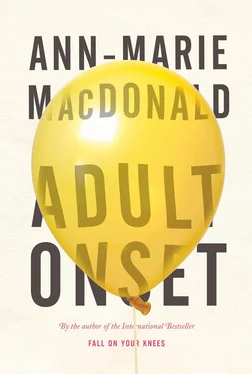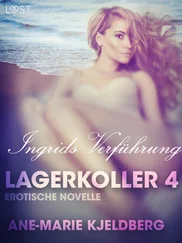“Mary Rose—”
“Or maybe Paul can hang one for you from the flies —”
“Stop it!”
She remembers.
A seared silence. The living room in Germany. In black-and-white, as if she were looking at a picture in the old photo album. This one is taken from the balcony doorway, looking in. There is the coffee table. There is the couch. There are no people, but there is a presence. A powerful sense that something has just happened. The air is pulsating. The air is shocked.
Hil breaks the silence, her voice calm. “I won’t do this anymore, Mister. I’m going to bed now. Good night.” She hangs up.
Mary Rose pounds her fist onto the inlaid cutting board but it’s a half-hearted blow which fails to whet her appetite for self-battery.
She slumps to the table and googles “stillbirth.” Hundreds of sites offer themselves up, she is taken aback by the very abundance — resources for counselling and support, page after page … She wonders what, if anything, was available in her mother’s day … Apart from you’ll have more babies .
She comes across an online photo gallery. Dozens of infants, dressed sweetly, some are holding stuffed animals. All are dead. There are names, and dates. There are messages from bereaved parents, family and friends. Some of the babies look to be sleeping the cosmic sleep of the healthy newborn. Others have discoloured faces, features slurring, foreheads awry in contrast with little toques and pompoms. She scrolls down the silent wailing wall, past name after name after name … Beloved. Mourned.
Other Mary Rose died and began to decompose in utero, her cells undoing themselves, undertaking the journey back to potential. But she had a face. Darkening perhaps, skin melting to the touch, distorted by forceps— don’t look . Look. A baby. Was she cradled, swaddled before being dispatched? Was she sealed in a bag, was the bag placed in a receptacle? Or tossed? At what point did the bag lose specificity amid the hospital waste — did the janitor know the difference between it and the weight of other sealed bags with their contents of diseased tissues, discarded organs, limbs, surgical dressings, all the things that were neither sharp nor flushable? Was she compacted amid catheter tubes, uneaten hospital food, swabs, tongue depressors, paper cups, before being shovelled into the incinerator? Unbaptized, therefore unnamed, therefore no one. Or did she end up on a dissection tray before a medical student? There would have been no need to ask permission of the parents — don’t trouble them with this sort of thing, it cannot harm, can only help.
She had a face. Even if it was slipping away, no longer adhering. She had a name, even though it too did not quite stick. She dreamt. She moved. She was someone.
Your sister .
Book Two: Escape from Otherwhere
Impossible to say whether it is day or night, a perpetual overcast has blocked the sun’s rays or trapped them here to grow stale. The ground is pitted and pocked — it could be the asphalt of an abandoned parking lot or schoolyard, except that no weeds are sprouting through the holes. It is unlike any place Kitty has ever seen on Hoam, where around each bend and over every hill is to be found a yet more perfect place for a picnic.
She resists the urge to retrace the stepping stones across the viscous stream and return to the thicket where she left Mr. Morrissey nursing his hindmost foot. She would gladly carry him all the way back through the Forgotten Wood rather than take another step into this drear place that has no name. But the Ebony Elf, though crafty, does not lie. If she says this is where Kitty will find two Black Tears, then she must press on. She fingers the vial on its silver chain around her neck and steps further into the gloom.
Kitty has seen marvels aplenty, not always pretty, so it is not the sight of the doll walking stiffly toward her across the pitiless ground that is perturbing, but the state of it. Not only is it naked, bereft even of hair, but half its moulded face appears to have melted then reset in shiny welts — the poor thing must have been thrown into the fire. Kitty waits and fights off a sense of approaching doom — after all, it is nothing but a harmless doll, lame and small. It stops in front of her. She can hear its laboured breath. It looks up at her with painted eyes that are scuffed but still discernibly blue.
“Hello, Kitty.”
Kitty freezes. How does it know her name?
“Don’t you remember me?” the thing wheezes.
Kitty shakes her head, suddenly reluctant to leave any part of herself behind here, even the sound of her voice.
The doll is sad but insistent. “Why did you send me away, Kitty?”
Kitty’s voice is barely a whisper. “I didn’t do anything to you.”
“Do you know what they did with me?”
What is this place? Is this Hell?
Suddenly it hisses, “I was incinerated.”
Kitty backs away.
“Don’t leave me,” whimpers the doll.
Suddenly its eyes flood black from lid to lid, and liquid night trickles down its damaged face. The tears! Kitty fumbles for the vial and makes a grab for the doll, but it evades her grasp, surprisingly agile.
“Not until you promise!”
“I’m not promising you anything.”
“I am not a bad thing,” rasps the demon. “But I will not give you your precious Black Tears until you have granted my wish.”
Kitty shivers. “What do you want?”
The doll tilts its head. “Don’t you remember me, Kitty?”
“I’ve never seen you before in my life.”
“I am yours.”
“No …”
“I am Susie.”
“Go away.”
“Hug me.”
Kitty is rooted to the spot, transfixed with horror and loathing. She longs to grab the fiend and hurl it, smash it against the cindery ground.
“No.”
“That is my wish.”
Kitty almost sobs with anger and revulsion, “I can’t.”
“Hold me, Kitty,” the thing wheezes, and stretches out its plastic arms.
“Never.”
“Never is what will happen to your brother, Jon. Never was, never will be.”
Kitty is gagging as she steps forward, bends down and picks it up. She squeezes her eyes shut and hugs. The doll makes a sound — small but terrible. She hears a rustling, feels a tugging. And then it is over.
She lets go with a shudder, as though she has just been sick to her stomach, and the doll drops to the ground. Kitty’s eyes are still shut when she says, “Now give me my tears.”
When the doll does not answer, she opens her eyes and beholds the most remarkable transformation. The doll’s face is smooth and unblemished, its eyes merry blue, its mouth a rosebud. No longer naked, it is clad in a blue satin robe, fastened snugly about the waist. Kitty cries out and reaches for her. “Susie!”
This time she hugs her tenderly; her doll feels so soft, just as she used to when Kitty was much younger, before she put her down one day and never picked her up again. Her tears are warm against Kitty’s shoulder. She cradles the beloved doll and looks lovingly into her sweet eyes where the tears are flowing — crystal clear.
She flings it to the ground. “You said you would give me the tears! You lied! What am I going to do?! Now Jon will never wake up, he will never have been, and I’ll never get home!”
Kitty begins to cry. Susie takes the vial from Kitty’s hand and catches the tears as they roll from Kitty’s cheeks in fat ebony drops.
Remembered Pain
She feels remarkably unscathed, considering how little sleep she has had. Last night she got to the bottom of something she did not know had been bothering her; and that can be better than sleep. She stayed up till three googling postpartum depression, ultimately ordering a book on the subject. Knowledge is power. The more she understands about her mother’s traumatic history and its effect on her own mothering, the better off her children will be. And it is nice to know that the coffee in her mug is completely decalcified. She rubs her arm and places a bowl of porridge in front of Maggie in her high chair and one for Matthew on his booster seat.
Читать дальше












